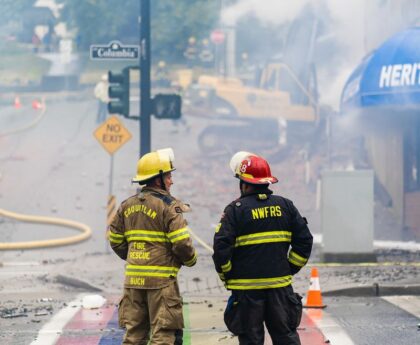Israel‘s Intelligence and Security Forces: A Colossal Failure
On October 7, 2023, Israel experienced a devastating attack by the Palestinian militant group Hamas, which has exposed a significant failure on the part of Israel‘s intelligence and security services. This large-scale attack, unprecedented in scale, caught Israeli authorities off guard and has raised serious questions about their ability to anticipate and prevent such an assault.
A Staggering Failure
The attack, carried out by approximately 1,000 militants, resulted in the deaths of at least 700 Israelis and left more than 2,100 wounded. In response, Israel launched air strikes on targets in the Gaza Strip, resulting in the deaths of over 400 Palestinians and over 2,300 injured. The death toll is expected to rise as the fighting continues.
Commenting on the failure of Israeli intelligence, Bruce Hoffman, a senior fellow for counterterrorism and homeland security at the Council on Foreign Relations, described it as a “colossal failure” and expressed astonishment that such an attack could occur. This failure is even more striking considering Israel‘s long-standing reputation for its advanced border fence, underground wall, and sophisticated intelligence apparatus.
The Breach of Israel‘s Defenses
Israel had taken great pride in its advanced border fence and underground wall near Gaza. However, on the day of the attack, Hamas fighters were able to breach the border fence in at least one location, using explosives and heavy equipment, as captured in videos from the scene. Additionally, militants conducted an amphibious operation on the Mediterranean Sea and used paragliders to reach two dozen locations in Israel.
Hamas also employed rocket attacks on a massive scale, surprising Israel‘s intelligence agencies and surveillance system. Israel is known to have extensive capabilities to monitor communication in Gaza and a large number of informants. The fact that this attack caught them off guard raises serious concerns about the effectiveness of their intelligence gathering.
Lack of Attention and Focus
One explanation for Israel‘s intelligence failure is the diversion of attention and resources to other areas of conflict. In recent months, the Israel Defense Forces had been focused on the West Bank, where Palestinian militants had been launching their own attacks against the Israeli occupation. Additionally, tensions surrounding the Al-Aqsa Mosque in Jerusalem had been a major concern for Israeli officials.
The distraction caused by events in the West Bank and Jerusalem allowed Hamas to exploit a perceived gap in Israel‘s defenses. Eyal Hulata, former Israeli National Security Advisor, characterized the attack as a very coordinated operation that tactically surprised Israel and caused devastating damage.
Domestic Political Problems
Israel‘s internal political divisions and ongoing domestic problems may have contributed to the intelligence failure. The country has been increasingly divided, with controversies surrounding changes to the judiciary system and mass protests against the government. It is not surprising that Hamas would choose to strike during a polarizing time, taking advantage of distractions and preoccupations within Israel.
The attack also took place during the Jewish Sabbath and the early hours of the Simchat Torah holiday, leading to fewer troops on duty. Israeli soldiers guarding the border reported that their base was overtaken by militants, resulting in the deaths of soldiers. The reduced presence on the border due to the holiday further contributed to the success of the attack.
Unprepared for a Ground Assault
Hamas, known for its rocket attacks on Israel, took advantage of the lack of preparedness for a ground assault by Israeli forces around Gaza. According to Hoffman, the Israeli forces were not battle-ready and had become complacent due to a period of relative calm on the border. This complacency should have raised suspicions and concerns among the intelligence community.
Moreover, the sheer scale and complexity of the attack were unimaginable and overwhelming. The combination of air, land, and sea attacks by Hamas is unprecedented for terrorist groups in recent history. Israeli intelligence, considered to be second-best only to the United States, has been unable to recall any previous instance where a group successfully staged a simultaneous coordinated assault using all three venues.
Implications and Advice
This colossal failure of Israeli intelligence and security forces raises several significant implications and warrants careful consideration:
Reevaluating Intelligence Capabilities
Israel needs to conduct a thorough reassessment of its intelligence capabilities to identify the loopholes that allowed Hamas to launch such a devastating attack. There must be an acknowledgment that no intelligence agency is omniscient or flawless, but this failure demonstrates a need for improvements. Enhancements in intelligence gathering, surveillance, and analysis are necessary to prevent future attacks.
Strategic Shift in Priority
Israel must reevaluate its strategic priorities and allocate resources accordingly. While the West Bank and Jerusalem are areas of concern, as evidenced by recent events, Israel cannot afford to neglect the security threats posed by Gaza. A more balanced approach to regional security is crucial to prevent any future surprises.
Unity in the Face of Crisis
The internal divisions within Israel have made the country vulnerable to external attacks. Unity and a sense of shared purpose are essential in times of crisis. Israeli leaders must foster a united front and address the domestic challenges to ensure that the country is resilient and prepared to respond effectively to any security threats.
Learning from Mistakes
The intelligence failure should serve as a wake-up call for Israel‘s security apparatus. By thoroughly examining the mistakes made and learning from them, Israel can enhance its intelligence capabilities. Collaboration with international partners, such as the United States, can facilitate knowledge sharing and strengthen Israel‘s defense against future attacks.
Israel must emerge from this devastating attack with a renewed commitment to its security and the well-being of its people. Addressing the failures and heeding the lessons learned will be crucial in preventing future intelligence and security breaches.

<< photo by Tima Miroshnichenko >>
The image is for illustrative purposes only and does not depict the actual situation.




